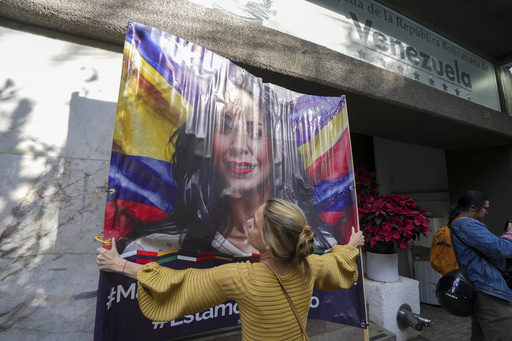CARACAS, Venezuela — Nicolás Maduro took an oath for a new term as president on Friday, continuing his increasingly authoritarian reign despite ongoing protests and criticism from several countries, including the United States, which allege he manipulated the outcome of last year’s elections.
The event took place at Venezuela’s legislative palace, which was heavily protected by security personnel who have been instrumental in maintaining Maduro’s grip on power since last summer’s contentious elections. Supporters of Maduro, many of whom wore pro-government apparel, filled nearby streets and plazas.
In his speech, Maduro likened himself to the biblical figure David battling Goliath, accusing his detractors and their American backers of attempting to transform his inauguration into a global conflict. He referred to his ability to take the oath for a third six-year term as a “great victory” for the nation’s peace and sovereignty.
“I have not been made president by the U.S. government or by pro-imperialist Latin American governments,” he stated while donning a sash that represented the colors of Venezuela’s flag. “I come from the people, I belong to the people, and my legitimacy is derived from history and the populace. To the people, I owe everything.”
The jovial atmosphere among Maduro’s allies starkly contrasted with the scenes of protest that occurred a day earlier, as hundreds of Venezuelans demonstrated against what they perceive as a usurpation of power. The protests unfolded in relative peace, but shortly after concluding, it was reported that María Corina Machado, a prominent opposition figure, faced a brief detention at the hands of security forces. Having emerged from hiding, Machado participated in the rally against Maduro.
In a subsequent video she shared online, Machado recounted a chaotic sequence of events involving national guardsmen who fired shots at her convoy and forcibly detained her while she was on a motorcycle. She added that her driver was injured in the leg during these events. However, she claimed the guards later coerced her into filming a video to deny her detention as they transported her, altering their course toward a military prison.
Supporters of Maduro accused the opposition of disseminating false information to provoke an international uproar, citing a brief video in which Machado appeared to state that she merely dropped her purse while being pursued.
“Maduro didn’t simply place a sash on his shoulder; he has shackled himself,” Machado remarked following the inauguration.
During his opening address, Maduro did not mention Machado. While state media reported the attendance of 10 heads of state, numerous global governments have explicitly rejected Maduro’s claims of victory, pointing to credible evidence indicating that his lesser-known challenger, Edmundo González, had defeated him by a substantial margin.
The coordinated sanctions imposed on Friday by the U.S., Canada, the U.K., and the European Union on over 20 officials highlighted the escalating isolation of Maduro’s administration, accusing them of dismantling democracy in Venezuela. This included loyalist members of the Supreme Court, election authorities, and executives from the state oil company.
In response to the “severe humanitarian emergency” in Venezuela, the Biden administration also extended special permission for 600,000 Venezuelan migrants residing in the U.S. to remain for an additional 18 months. Additionally, they increased the reward for the capture of both Maduro and Interior Minister Diosdado Cabello, wanted on drug trafficking charges, while placing a new bounty for Defense Minister Vladimir Padrino.
In a video from the Dominican Republic, González expressed gratitude toward those who support democracy in Venezuela, referencing the recent sanctions.
“He has crowned himself as a dictator,” González stated about Maduro, asserting that the people and democratic governments do not endorse him. He indicated plans to return to Venezuela once conditions allow.
Maduro’s previously contested election in 2018 was widely seen as fraudulent after major opponents were barred from participating. Current opposition members maintain that last year’s elections were tainted by similar irregularities, presenting evidence in the form of tallies from 85% of voting machines that purportedly indicated González as the clear winner. Observers from the United Nations and the Carter Center confirmed that the voting counts shared by the opposition appear valid.
Nevertheless, electoral officials loyal to Maduro declared him the winner a few hours post-election, but they did not release detailed voting figures as they had in prior races. The ongoing dispute prompted significant backlash, leading to nationwide unrest. Government forces responded with violence, resulting in over 2,000 arrests and more than 20 fatalities during protests. Numerous foreigners were also apprehended.
Outside the inauguration, many of Maduro’s supporters expressed joy and relief at his continued presidency. Among them was 18-year-old Maricarmen Ruiz, who was overcome with emotion. “Words fail to describe my happiness,” she conveyed, relieved that González was not in a position of leadership instead.
Attendees at the inauguration included leaders from Nicaragua and Cuba, yet notable allies, such as Colombian President Gustavo Petro, were absent, citing the recent imprisonment of an opposition figure as a reason. González, who fled to Spain in September, had vowed to confront an arrest warrant and reclaim his position, but Maduro’s closure of national airspace and borders complicated this. Machado advised against González’s return, alluding to the current “coup-like” environment.
González’s family has faced difficulties as well, with his son-in-law reportedly kidnapped by masked individuals while taking children to school. His daughter condemned the government for her husband’s abduction, questioning, “When did it become a crime to be related to Edmundo González Urrutia?”



